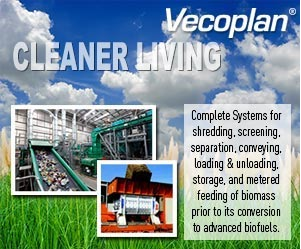Renewable Energy Systems
Renewable energy is a broad term covering many resources. Obviously it refers to energy derived from sources that replenish themselves in relatively short time periods. Generally measured in human time frames. These energy resources include, but are not limited to: solar, wind, hydro, tidal, geothermal, and biomass. Due to the vast quantities of waste produced by humans (251 million tons annually in the U.S. alone, according to the US EPA), waste has also been identified as a renewable energy source.

Capitalizing on the energy from these renewable resources requires two things. Technologies adept at obtaining the energy in an economically feasible manner and leaders from the public, private and industrial sectors working in concert to make renewable energy systems a reality. Vecoplan is the leading industrial provider of mechanical technologies that process and prepare biomass or waste as a feedstock for conversion to fuels and energy.
Vecoplan is recognized as a worldwide leader in renewable energy systems because of its longevity, its global footprint and its innovative technologies. Founded in 1969, Vecoplan has provided machinery to process biomass and waste for over 45 years. With equipment on every continent except Antarctica, Vecoplan has more systems, processing more biomass & waste materials, in more countries, than any other company – period. In addition to holding several patents on individual mechanical technologies, Vecoplan continues to research and develop the most efficient methods of incorporating its comprehensive array of technologies into automated systems that prepare renewable resources for conversion to energy.
Mechanical technologies for deriving energy from biomass & waste can be as simple as shredding, grinding or chipping machines that process materials for firing boilers in CHP (Combined Heat & Power) plants. These cogeneration boilers then produce heat, as well as steam, to power turbines that produce electricity. Other methods of deriving energy from these resources involves converting them to fuels that can be stored and transported. These fuels include, but are not limited to: pellets, syngas, cellulosic ethanol, biodiesel, and other second-generation liquid transportation fuels. Preparing biomass or waste for these conversion technologies requires more sophisticated renewable energy solutions.
Mechanical technologies incorporated into Vecoplan renewable energy systems are determined by the make-up of materials to be processed and the end product that needs to be produced. What are you feeding in and what do you want feeding out. Technologies offered by Vecoplan include: receiving, primary size reduction, screening, separation, sorting, secondary size reduction, storage, testing, metered feeding, conveyance between these various work stations, and an integrated control system that ensures all machinery works together to produce the desired end product.
Biomass refers to all organic material. Through photosynthesis, biomass stores energy in the form of carbon compounds. Vecoplan systems aid in the recovery of this stored energy. Vecoplan is experienced in processing a full spectrum of biomass for conversion to energy and fuels. Examples of the types of biomass processed by Vecoplan machines and systems include wood harvested for fuel or wood waste, agricultural energy crops such as switch grass and miscanthus or ag waste such as corn stover. Vecoplan systems can process virtually any form of organic matter that can be used as a renewable energy resource.
Waste refers to anything discarded by humans. Commercial waste, industrial waste and consumer waste are all rich sources of energy. This is in part because much of the material in our waste streams is either a form of biomass, such as scrap wood from used wooden products or biomass that has been converted into materials such as paper, cardboard and textiles. But even synthetic materials, such as scrap plastics and discarded products made from plastics such as packaging, carpet and film can be mined for conversion to fuels. Vecoplan systems prepare all of these forms of waste into feedstock that can then be converted to renewable fuels.
Vecoplan can partner with you in developing a sustainable renewable energy production system. Vecoplan has years of experience with machinery and systems that process and prepare a comprehensive variety of renewable biomass and waste resources for a broad spectrum of fuel conversion technologies. From agricultural crops to woody biomass and MSW (Solid Municipal Waste), our experience in processing systems has made us the global leader in economically feasible renewable energy systems. Throughout the world, Vecoplan has become an important part of recycling and renewable fuel systems. Many of the top recycling and renewable energy companies use our technology in bioenergy plants. Contact us today for more information.
